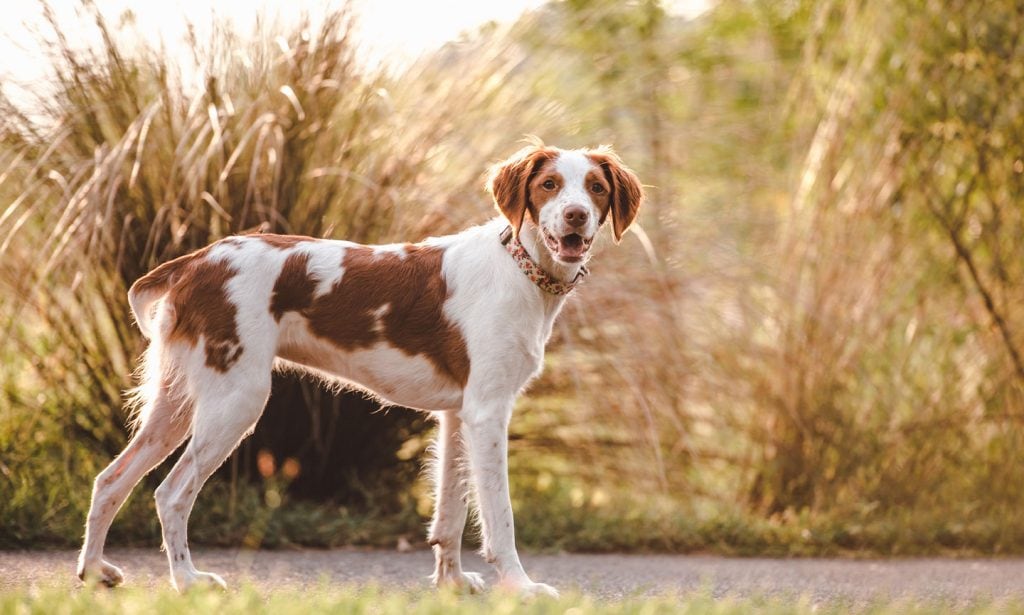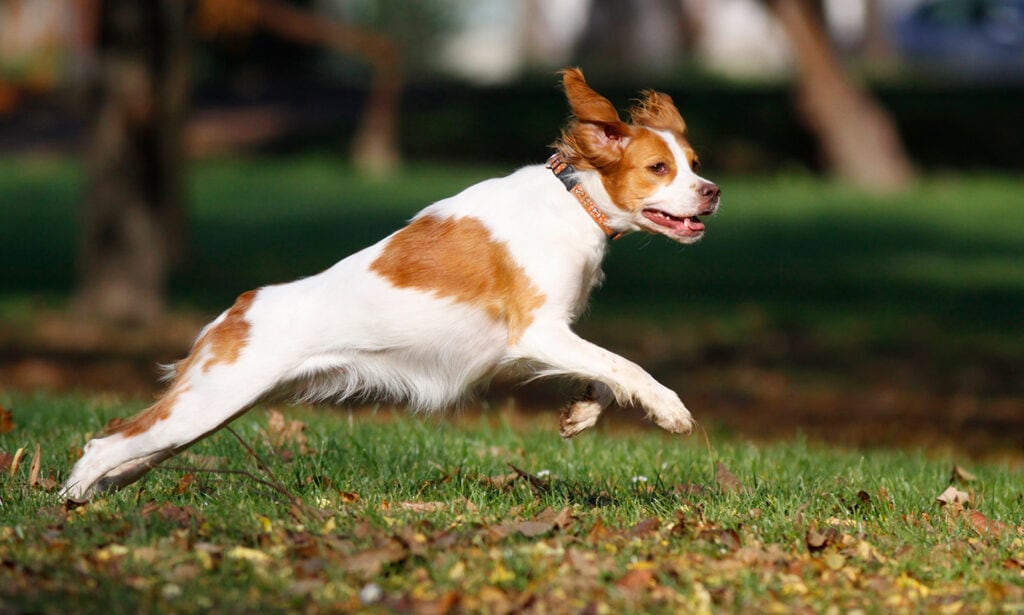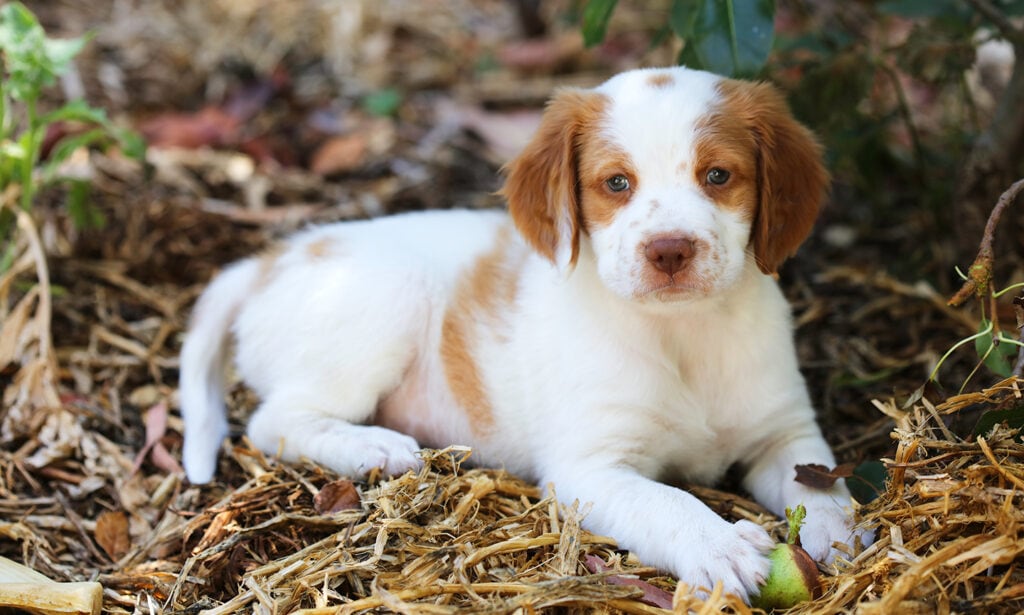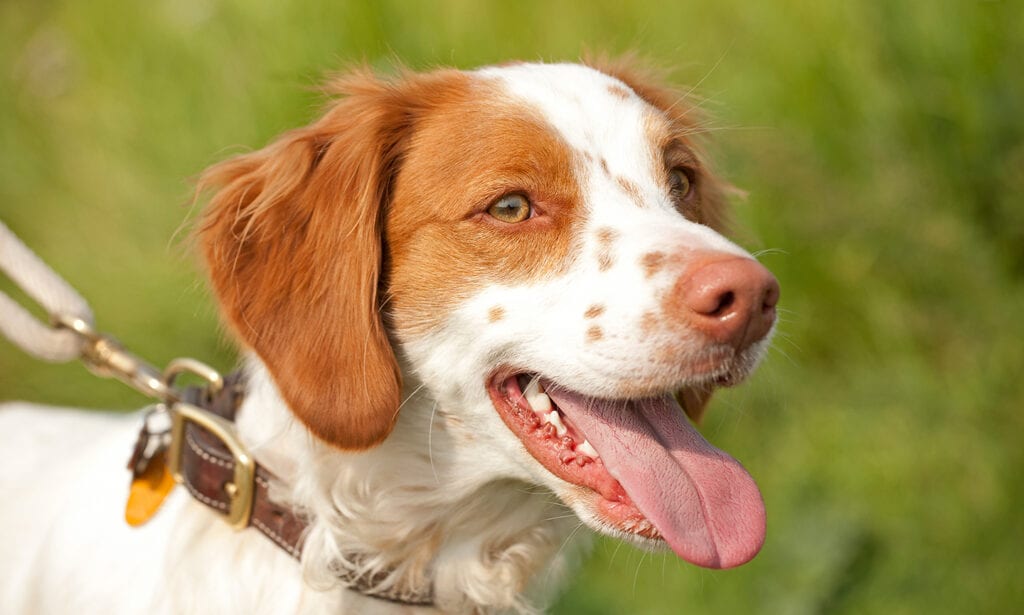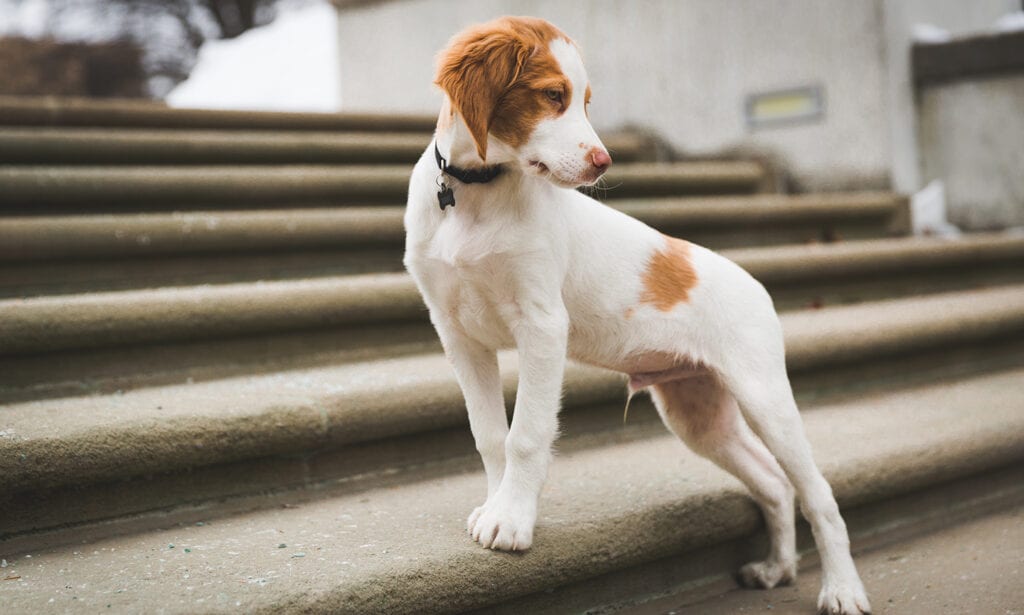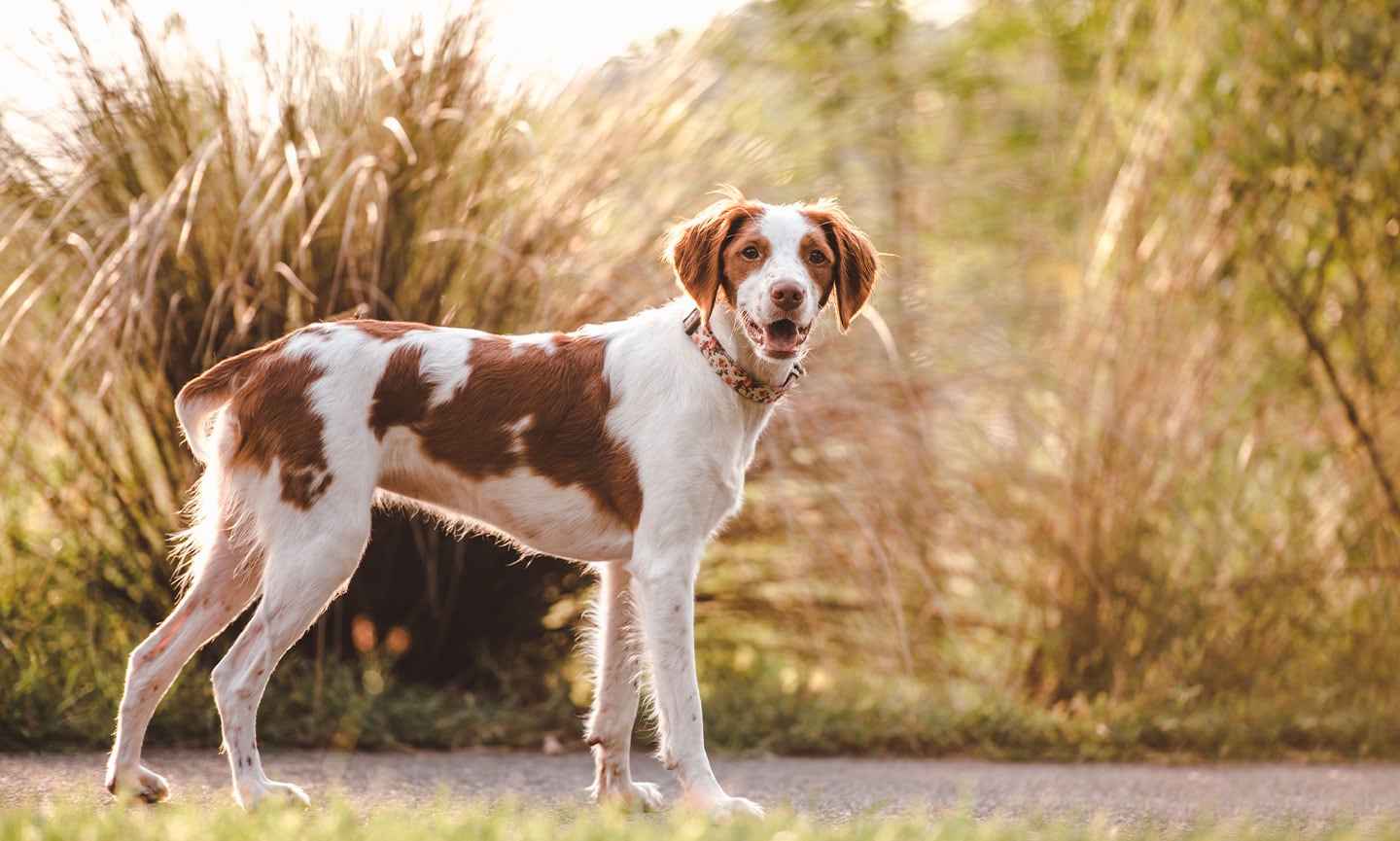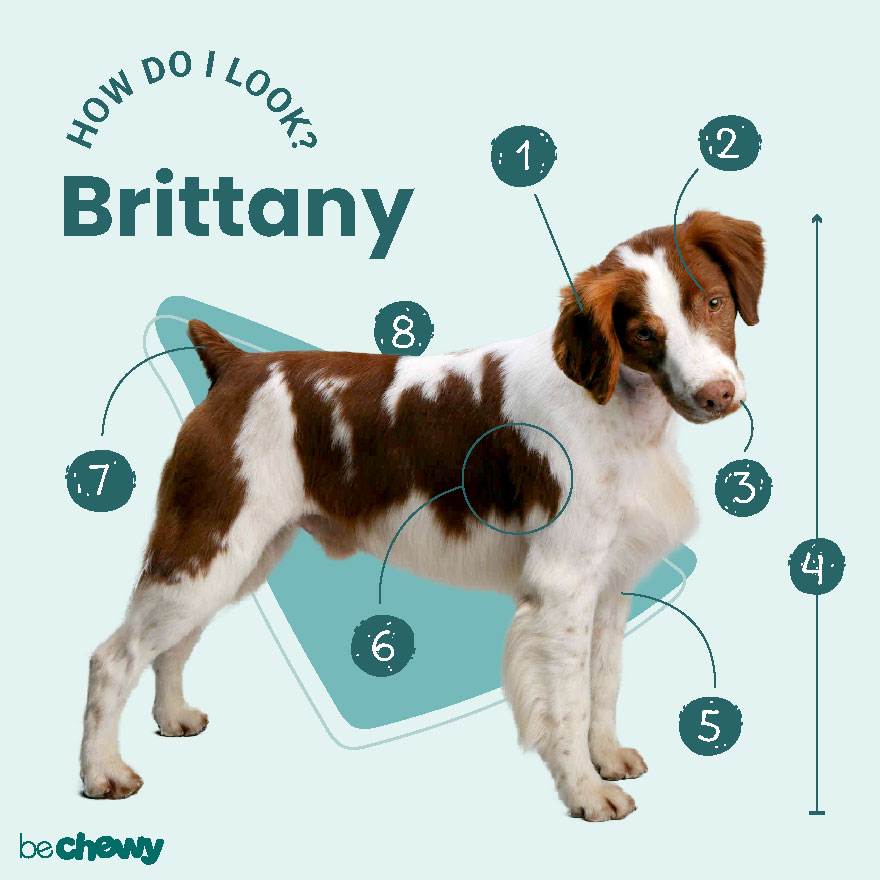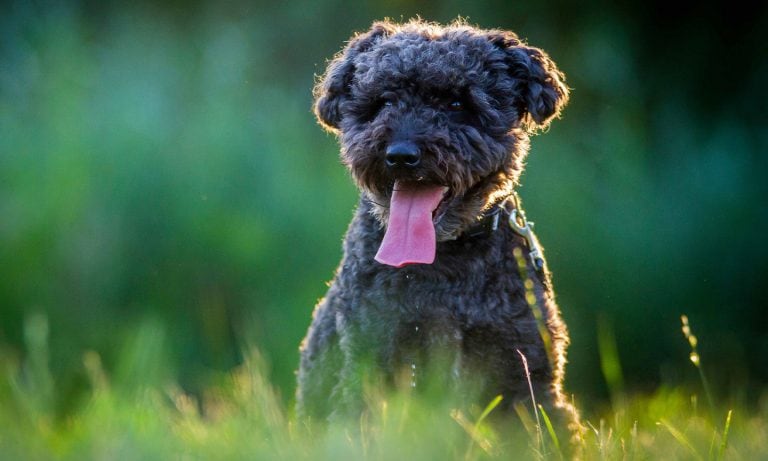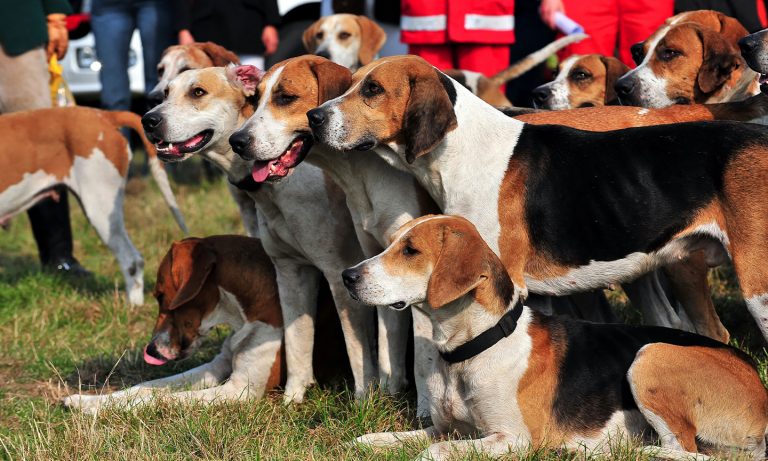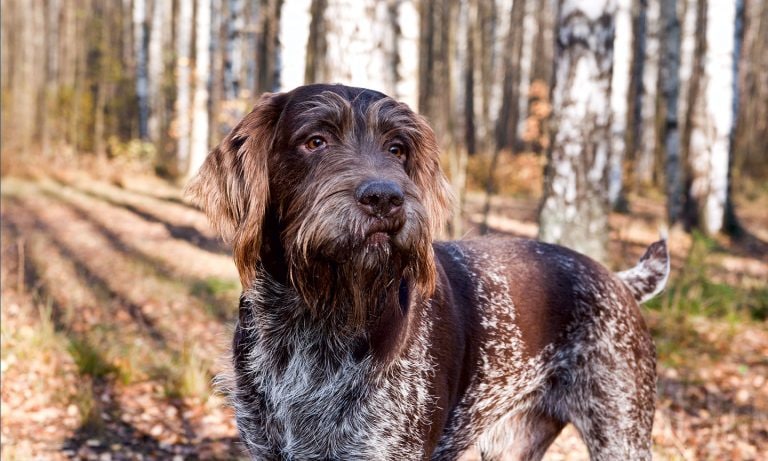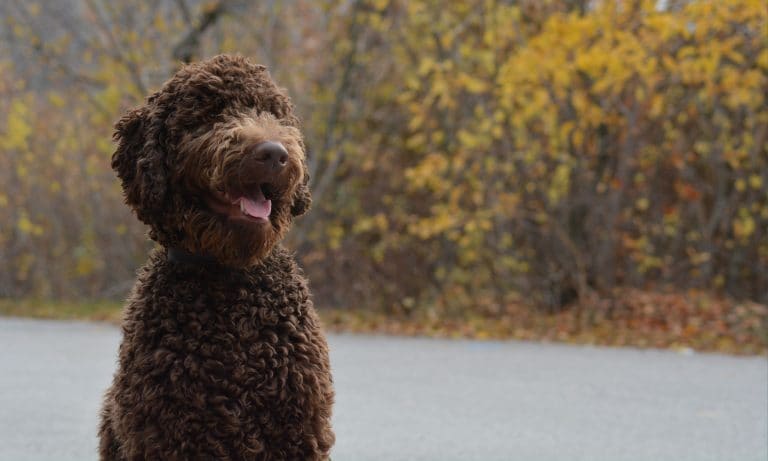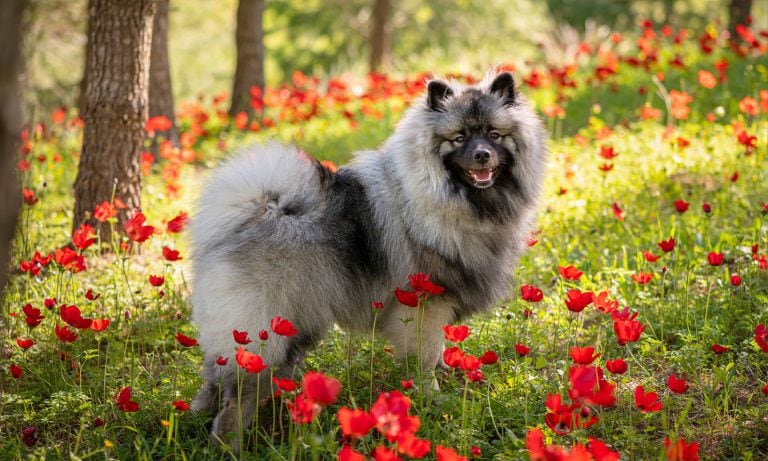The Brittany’s enthusiasm and energy is almost always at 100 percent. If you’re the proud parent of a Brittany, we’re guessing you plan your vacation itineraries in 15-minute time slots—so many activities with so little time! The Brittany is raring to go no matter what you throw at them: errands, a run around the neighborhood, your afternoon Instagram shoot at the local park, and, of course, dinner with friends—it’s your week to host! Energetic, fun and upbeat, a Brittany’s the perfect match for your active life.
Breed Snapshot
Temperament:
EnergeticSocial ButterflySmartCoat Color:
Liver And WhiteLiver RoanLiver White And OrangeOrange And WhiteOrange RoanWhite And LiverWhite And Orange
Best For
Brittany dogs are not only upbeat, super-social butterflies, but they're also very intelligent and adaptable. They were bred to be versatile hunting dogs, after all! That said, Brittanies thrive with active pet parents who can provide lots of training and socialization and plenty of playtime.
Brittany Temperament
The Brittany dog is a friendly, affectionate pet who loves spending time with their people. A true companion dog, they want to be with you all the time and would really prefer to be in your company than anywhere else.
Bred to be a versatile hunting dog, they are intelligent, adaptable and ready for action at a moment’s notice, whether competing in a tracking event or taking a walk in the park. And these high-energy pups enjoy a lot of activity, so plan on them running with you every morning. Just be prepared for shouts of “Pretty dog!” and “Go, puppy, go!” Your friendly pup will manage a cheerful smile and a butt wiggle without missing a step.
Though playful and energetic, Brittanies are not fans of homes with a lot of chaos. These pups are truly sensitive souls who want harmony in the home, and raised voices—even if you’re shouting at a referee on TV—may cause the dog stress.
Brittany dogs aren’t known for aggression or biting. Born to be a bird dog, they have a “soft mouth,” like a Labrador Retriever, which means they can control the strength of their bite. They’ll even gently carry their favorite toy around the house. Their happy-go-lucky personality means they’re happy to share that toy with their two and four-legged family members. Hope you’re ready for a few games of fetch with a slobbery tennis ball!
How to Care for a Brittany
Overall, Brittany dogs’ care needs are moderate. Their grooming routine is minimal, and bathing is made easier because of their short coat. As a bonus, these pups are easy to train. And let’s face it, either activity will fill the attention meter and make your pup content. Their biggest need will be enough exercise, so make sure you have the time to give it to them.
Brittany Health
The Brittany breed suffers very few major health issues or genetic defects. With an expected lifespan of 12-14 years, your fluffy friend should be with you for a long time. While they have relatively few health issues, here are a couple you should watch for.
- Hypothyroidism: Hypothyroidism is one of the most common endocrine disorders in dogs. It is caused by decreased thyroid gland function, secondary to thyroid inflammation or thyroid atrophy. The thyroid gland is responsible for regulating metabolism. Decreased thyroid activity can therefore lead to weight gain (without increased appetite), lethargy, skin and coat changes, reproductive difficulties, and some neurological conditions. Hypothyroidism can be diagnosed through blood testing, so thyroid levels should be a part of routine screening bloodwork as Brittany’s age. This condition can be managed with medications.
- Hip Dysplasia: Hip dysplasia is a condition that occurs as a dog grows, causing the hip joints to develop improperly. The result is instability or looseness of the hip joint and eventually leads to cartilage wear and degenerative arthritis. Degenerative arthritis can further lead to muscle weakness and joint stiffness, as well as pain. This condition is typically diagnosed with X-rays. Symptoms include decreased activity, diminished range of motion in the rear limbs and “bunny hopping.” Treatments may include medications, joint supplements, weight management and physical therapy. Severe cases may be treated surgically.
- Eye Disease: Eye diseases such as cataracts and glaucoma are other potential health issues. Cataracts cause the lenses of the eyes to become opaque and can lead to blindness. Glaucoma is caused by an increase in intraocular pressure and can lead to slowly developing or sudden blindness and pain. Monitor your pet for any changes in pupil size, eye color, cloudiness, squinting, rubbing, or any difficulty seeing. More advanced glaucoma may appear as a swollen or bulging eye. Schedule an appointment promptly with your vet if you have any concerns. Eye disease is often treatable with medication and sometimes surgery.
- Epilepsy: Epilepsy is a common neurological disorder that affects the brain and results in recurrent seizures. Epilepsy is diagnosed when all other causes of seizures have been investigated and ruled out. Epilepsy ranges in severity, with some dogs experiencing seizures very rarely and others as often as daily. Depending on the severity, medications are available to control the seizure activity.
Brittany History
The Brittany breed’s origins come from the Brittany region of France, likely in the 17th century. We all like to show off our fur babies, and the people of that time were no different. Hunting dogs who resemble the Brittany breed show up in paintings and tapestries from around that time, like their close relatives, the English Setters.
In the 1600s, only nobles and wealthy landowners had enough money to keep entire kennels of dogs specialized for different types of hunting. Commoners, and sometimes poachers, needed all-purpose dogs who could point, flush and retrieve. The Brittany, like the German Shorthaired Pointer, is a versatile hunting pup. The Brittany was also bred to be an adept bird dog.
The American Kennel Club (AKC) recognized the breed, then known as the Brittany Spaniel, in 1934. The breed first became popular in the United States in the 1940s, and today is No. 28 on the AKC’s most popular dog breed list. Their versatility is part of what makes them so popular. Unlike many breeds, Brittanies are considered to be a dual breed, meaning they excel at both conformation competitions and field trials. In fact, the Brittany breed has the most dual champions of any AKC Sporting breed. (Sporting dogs were bred to work with hunters.) To be a dual champion, the dog must be a finished show champion and a field champion of record.
Are you looking to buy a Brittany puppy? You can find a list of reputable breeders on the AKC’s website. Prices for a Brittany puppy range $700-$1,000. But for that price, you likely get a pup who’s been screened for health and temperament issues and may come with pedigree papers. Would you rather adopt a Brittany in need of a home? Check out the American Brittany Rescue, or keep an eye out for the pup at your local animal shelter. You can also search Chewy’s database of adoptable dogs in your area.
FAQs
Do Brittany dogs shed?
Yes, Brittany dogs shed a little year-round. But with a weekly brush, you can keep their shedding at bay.
Are Brittany dogs good family dogs?
Yes! Brittany dogs are excellent family dogs—when they get enough exercise and attention. With proper training and socialization starting in puppyhood, your Brittany will become the social butterfly of the neighborhood. It’s also important to teach kids how to interact with dogs.
Do Brittany dogs bark a lot?
Brittany dogs are not excessive barkers; they only bark when they feel it’s necessary, either when someone comes to the door, a squirrel’s in the backyard or while playing.
How big do Brittany dogs get?
The Brittany dog is a medium dog and doesn’t get very big. Brittanies weigh 30-40 pounds and are shorter than 21 inches at the shoulder. They are small enough to ride in the car with you comfortably when you run out for coffee, but not so small that you have to worry about losing them in tall grass.
What are the most common Brittany mixes?
- Brittany-Greyhound mix
- Brittany-Whippet mix
- Brittany-German Shepherd mix
- Brittany-Golden Retriever mix
- Brittany-Husky
Note: These are not purebred dogs but mixed breeds.

Top Takeaways
Brittany dogs, also known as the Brittany Spaniel, are superstars in the show ring, in field competitions and in your own backyard. This versatile dog can do a bit of everything, and they’ll look good while they’re doing it!
Expert input provided by veterinarian Dr. Philip Brown, DVM, Animal Care Center, Springfield, Missouri; Kathy Hawkins, trainer at Springfield Missouri Dog Training Club; and Lisa Smith, owner/head trainer at On The Spot Dog Training, Springfield, Missouri.
Photo credit for “How do I look?” New York Times.
Breed characteristic ratings provided by Dr. Sarah J. Wooten, DVM, CVJ, a veterinarian at Sheep Draw Veterinary Hospital in Greeley, Colorado; dog trainer and behavior consultant Irith Bloom, CPDT-KSA, CBCC-KA, CDBC, owner of The Sophisticated Dog, LLC, in Los Angeles; and certified animal behavior consultant Amy Shojai, CABC, in Sherman, Texas.
The health content was medically reviewed by Chewy vets.

Search for Adoptable Brittanys Near You
Female Names
- Lucy
- Piper
- Penny
- Sadie
- Millie
- Bella
- Daisy
- Ruby
- Bailey
- Maggie
Male Names
- Cooper
- Finn
- Scout
- Tucker
- Copper
- Gunner
- Ruger
- Hank
- Archie
- Charlie
Share:
